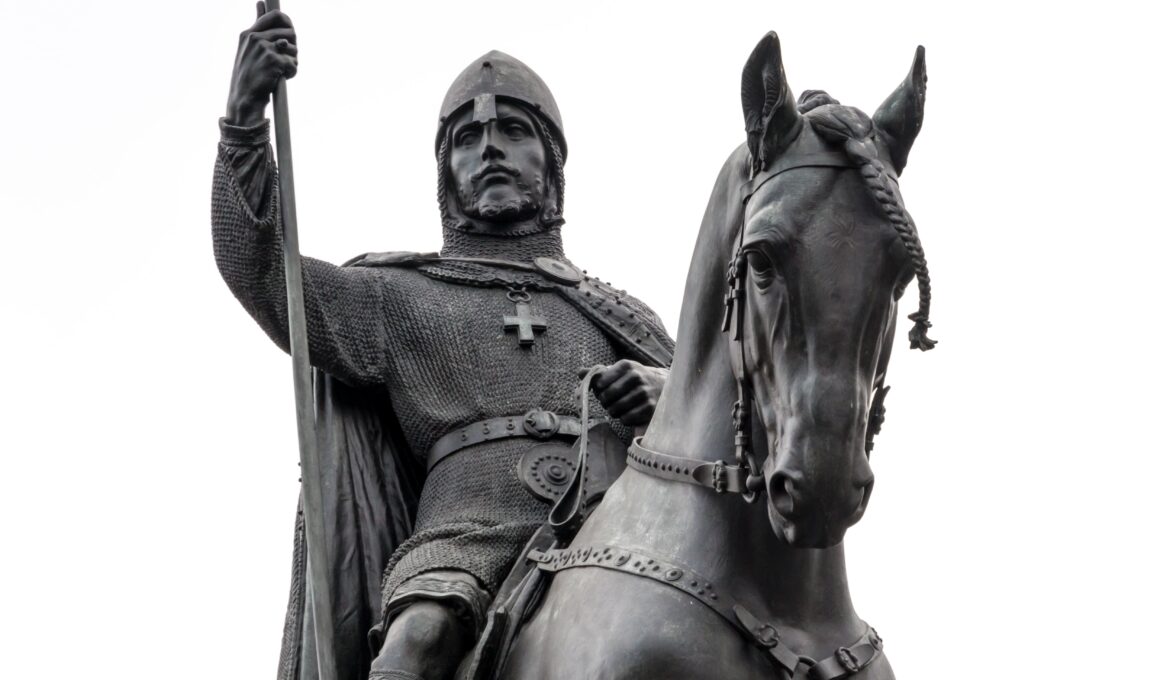Table of contents Show
The legacy of King Wenceslas in Prague stands out as a regal thread that permeates both the Czech history books and the very essence of its capital, among the numerous chapters that have molded this mesmerizing metropolis.Read this piece and discover the rich royal legacy of King Wenceslas in Prague that goes beyond a mere historical excursion.
Everywhere you look in Prague, from the lively Wenceslas Square to the historic Prague Castle and St. Vitus Cathedral, you can feel the influence of Wenceslas’ rule.
The cultural and spiritual fabric of a city that keeps remembering a king who made an everlasting impression on Czech history is just as important as the physical monuments that bear his name.
Today, King Wenceslas in Prague is a cultural icon. His statue in Prague’s Wenceslas Square and yearly feast day commemorate his lasting impact on Bohemia and Christianity.
Who Was King Wenceslas? A Historical Perspective

Who was King Wenceslas? King Wenceslas (Saint Wenceslas) is important in Czech history and folklore. Early Czech history was shaped by this late 9th-century medieval monarch. For generations, Czech culture has cherished his life and legacy.
Early Life
In 907 AD, Václav, known as Wenceslas, was born into the ruling Přemyslid dynasty in Bohemia. He was the son of Bohemia Duke Vratislaus I. When his father died, Wenceslas’s grandmother, Saint Ludmila, became his regent. Ludmila, a devoted Christian, shaped Wenceslas’s upbringing and Christian religion.
Elevation to the Throne
In 924 AD, Wenceslas became the king of Bohemia as he aged. The province became Christianized and culturally developed during his rule. Wenceslas was a devout Christian who wanted to strengthen the Church in Bohemia.
Christian Legacy
Wenceslas was instrumental in spreading Christianity in Bohemia. He founded churches, invited missionaries, and sponsored clergy. He was known for his piety and generosity in Christianizing Bohemia.
Good King Wenceslas
The story of “Good King Wenceslas” remains a significant element of his legacy. A later 19th-century carol by John Mason Neale recounts Wenceslas’s bravery in winter to give charity to a destitute peasant on St. Stephen’s Day. The carol shows the king’s charity and Christian values.
Conflict and Martyrdom
During Wenceslas’s rule, he experienced internal family conflicts and martyrdom. His younger brother Boleslaus the Cruel wanted the throne. Wenceslas was slain by Boleslaus followers at a feast in 935 AD, probably due to political and theological disputes in the royal family. Wenceslas’ martyrdom helped him become a saint.
Canonization and Legacy
King Wenceslas is a Catholic saint whose feast day popularly known as Wenceslas day in Prague is observed on September 28th. He was a Christian martyr and beneficent leader known for centuries. The carol’s account of his benevolent conduct strengthened his reputation as a just monarch.
The Legend & the Story of Good King Wenceslas
The Good King Wenceslas story has become an integral part of Christmas culture and tradition, having survived the test of time. The mythology has developed from its origins in the life of Saint Wenceslas, Duke of Bohemia, drawing on both historical accounts and tradition to tell a story that honors Christmas spirit, charity, and compassion.
Whether based on historical fact or enhanced by mythology, the narrative of Good King Wenceslas is a timeless favorite, captivating hearts and minds and fostering the attitude of generosity and goodwill that is central to Christmas.
Exploring the Song “Good King Wenceslas” and the meaning
In addition to its beautiful melody, the timeless Christmas hymn “Good King Wenceslas” has a powerful message about kindness, generosity, and the power of compassion. The Good King Wenceslas song has deep historical roots and beautiful poetic imagery give it levels of meaning that touch listeners and make them think about what it means to celebrate Christmas in the real sense.
Historical Context
King Wenceslas in Prague, Duke of Bohemia (d. 10th century), is the historical figure whose life serves as the inspiration for the hymn. Although the carol has historical origins, it deviates from retelling the events of Wenceslas’s life to create a story that exemplifies the Christmas season’s virtues.
A Story of Charity in the Winter
On the Feast of Stephen, the day following Christmas, King Wenceslas in Prague sees a poor peasant braving the freezing weather to gather wood, and the hymn begins. The king’s compassion compels him to brave the snowstorm to bring the man food and shelter. As the moonlight illuminates the frozen countryside, Wenceslas travels with his page by his side.
A symbol of compassion and generosity is the king’s act of giving from his plenty to someone less fortunate. Similar to Christian principles of generosity and kindness, the striking picture of a king enduring the cold to help a lowly subject conveys the spirit of unselfish giving.
The Page’s Symbolism
The page character is more than just a friend to King Wenceslas; her role in the song is profoundly significant. The story’s page struggles to keep walking in the freezing weather, but the sound of the footsteps of King Wenceslas in Prague , which are miraculously warm, motivates him to keep going. One possible reading sees this as a symbol of the transforming and motivating power of compassionate leadership. On this page, we see the triumph of individuals who, thanks to a leader’s compassion, rediscover their inner fortitude and sense of direction.
The Transformative Power of Kindness
This is the core message that “Good King Wenceslas” tries to communicate. A single act of kindness can shine a light and provide solace to others, even in the darkest and coldest of times, as the king’s readiness to share his warmth and plenty with a stranger in need demonstrates.
The Universality of Virtues
Although the song is based on a real person from history, the lesson of virtue is timeless and applicable to all cultures. The eternal message of compassion, empathy, and charity conveyed in “Good King Wenceslas” makes the song an ideal accompaniment to any Christmas celebration.
Finally, “Good King Wenceslas” isn’t just a catchy holiday tune; it’s a moving story that perfectly captures the essence of the season. The Good King Wenceslas meaning has historical roots, vivid imagery, and enduring message of compassion inspire listeners to embrace the ideals it champions, creating a feeling of kindness and generosity that lasts long after the winter’s Eve it portrays.





